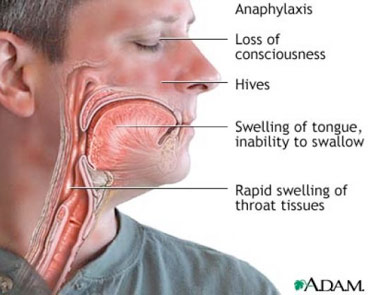- What Are Allergies? - May 20, 2013
What are Allergies?
Perhaps the earliest report of an allergic reaction occurred approximately in 3640 BC, when the king of Menes, Egypt, was stung by a wasp and died.
STATISTIC: At least one out of every five Americans suffers from allergies.
What are Allergies?
 Allergies are the immune system’s mistaken response to a harmless substance, such as pollen or lint. Normally, the immune system defends your body against dangerous particles that can be hazardous to your health, such as bacteria and viruses.
Allergies are the immune system’s mistaken response to a harmless substance, such as pollen or lint. Normally, the immune system defends your body against dangerous particles that can be hazardous to your health, such as bacteria and viruses.
However, the immune system sometimes has difficulty identifying which substances are harmless and which are dangerous. When people who have allergies come into contact with an allergen, their immune system launches a response.
Thousands of antibodies (the immune system’s weapons against infections) attach themselves to the surface of special cells in body tissue called mast cells, which then wait for your next exposure to that specific allergen. While they are waiting, these mast cells absorb many different chemicals from the blood that will aid in the body’s defense.
When the allergen is introduced to your body again, the allergen binds to the mast cells, causing the mast cells to release the chemicals. A common chemical which is released is called histamine.
Histamine is a major factor in the allergic response system and causes many of the reactions, such as a runny nose, sneezing, watery and irritating eyes.
What substances cause allergies?
Common causes of allergies include food allergies such as peanuts or milk. Seasonal allergies may result from grass, weed, tree pollen, or various molds. Other allergies may occur from cat or dog hair. One may also be allergic to insects, drugs, or even dust.
What are the symptoms of allergies?
Allergic reactions can range from mild to severe. Symptoms can occur in any part of the body. Most of the time, allergies affect the nose, eyes and throat. A severe symptom is anaphylactic shock, where many organs are affected and is usually followed by unconsciousness and inability to breathe. Other symptoms include:
- Coughing
- Sneezing
- Congestion
- Itchy, runny nose
- Swollen eyes (conjunctivitis)
- Runny, stuffy nose
- Flaking or peeling skin
- Tingling mouth
- Swelling of the lips, tongue, face or throat
- Hives
- Anaphylactic shock (severe emergency which is fatal if untreated)
- Cough, chest tightness, wheezing or shortness of breath
- Rash
- Facial swelling
- Wheezing

Who Gets Allergies?
The risk of having allergies starts with your genes. While specific allergies are not inherited, the likelihood toward having allergies is. Children with one allergic parent have a 33% chance of developing allergies. Children who have both parents who have allergies have a 70% chance.
A lot remains mysterious about just what causes allergies to develop. But it does seem that your current health may have an impact. For example, if you come into contact with an allergen when you are recovering from a viral infection, you might be more likely to develop an allergy.
What happens if allergies are left untreated?
If allergies are left untreated, the symptoms may continue to worsen until a serious health risk presents itself. Many chronic allergy sufferers have learned to cope with their allergy symptoms, so that they become more of an annoyance than an incapacitating condition. However there are complications of untreated allergy including:
- sinusitits
- asthma
- chronic bronchitis
- chronic nasal ostruction
- laryngitis
What are the treatment options?
Although allergies are not always 100% curable, there are many different treatment options.
Avoidance: The most basic route is to avoid what triggers your allergies. Your doctor will help you take steps to identify and avoid what triggers your allergies. This is an important step in preventing allergic reactions and reducing symptoms.
Medications: Allergy medications can help reduce your immune system reaction and ease symptoms. The drugs you use depend on the type of allergy you have. They can include over the counter or prescription medications. These medications may be oral medications, nasal sprays or eye drops. Some common allergy medications include corticosteroids, antihistamines, decongestants, cromolyn sodium and leukotriene modifiers.
Immunotherapy: For allergies not completely relieved by other treatment, your doctor may recommend allergy shots. This treatment involves a series of injections of purified allergen extracts, usually given over a period of a few years. A newer technique is sublingual immunotherapy (SLIT) which involves a vial of liquid allergen that you administer as drops under your tongue at home.
Emergency treatment: For severe allergies, you may need emergency epinephrine. Your doctor may give you an emergency epinephrine shot to carry with you at all times. An epinephrine shot (such as EpiPen or Twinject) can reduce symptoms until you get emergency treatment.



